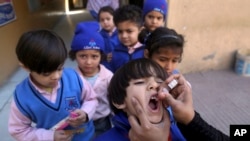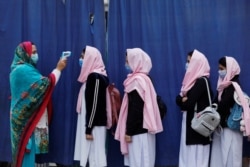Pakistan began nationwide door-to-door polio vaccinations Monday of children as the South Asian nation of about 220 million people battles a substantial surge in COVID-19 infections.
Pakistan is one of two countries in the world, along with neighboring Afghanistan, where the polio virus remains endemic and efforts to eradicate the crippling disease continue to face challenges.
The five-day polio immunization drive is aimed at vaccinating more than 40 million children in the country under five years old, said Faisal Sultan, special assistant to the Pakistani prime minister on national health services.
Sultan said the government has engaged some 285,000 front-line workers in 156 Pakistani districts to administer polio drops to the targeted population.
Hours after Monday’s vaccination drive began, authorities imposed partial lockdowns in “high-risk” Pakistani districts, including the capital, Islamabad, citing a “very dangerous” spike in new coronavirus cases.
Since the coronavirus outbreak in the country 13 months ago, the government has recorded more than 14,300 deaths from COVID-19 and 663,000 infections, including 41 deaths and more than 4,500 new cases in the last 24 hours.
Pakistani officials said the rate of people testing positive for COVID-19 has risen to an alarming 12% from a low of about 3% a few weeks ago, suggesting the actual number of infections is likely much higher than the reported cases.
Sultan said the current wave of coronavirus infections has the "potential to be worse than the first one in the summer of 2020,” when Pakistan imposed a nationwide lockdown to contain the virus.
“COVID-19 continues to challenge us, but we are committed to ensure continuity of the essential public health services during these difficult times,” Sultan said. “It is an absolute must that all our eligible children stay protected against vaccine-preventable diseases, including polio.”
Sultan urged the public to cooperate with polio teams and instructed authorities to ensure the protection of health care workers.
Anti-polio drives in Pakistan have suffered setbacks in recent years due to attacks on vaccinators and police personnel guarding them.
Islamist militants see the polio vaccine as an effort to collect intelligence on their activities, while radical religious groups in conservative rural parts of majority-Muslim Pakistan reject the immunization as a Western-led conspiracy to sterilize children.
The false information has triggered attacks during immunization campaigns, killing scores of health care workers and security forces in the last decade.
Pakistani officials insist the attacks on polio teams have particularly increased since 2011 when the U.S. Central Intelligence Agency arranged a fake vaccination campaign with the help of a local doctor, enabling U.S. forces to locate and kill fugitive al-Qaida chief Osama bin Laden deep inside Pakistan.
Pakistan, where polio infected 84 children in 2020, has reported one confirmed case so far this year.
“The year 2021 presents a unique opportunity to leverage the gains made in 2020, despite the challenges of the (COVID-19) pandemic,” said a government statement released in connection with Monday’s launch of the immunization drive.
“We have started witnessing the impact of our hard work over the last six months in terms of improved epidemiology. This is reflected by the declining polio cases and decreased detection of viruses in sewage samples,” said Dr. Shahzad Baig of the Polio Eradication Initiative (PEI), who is quoted in the government statement.





